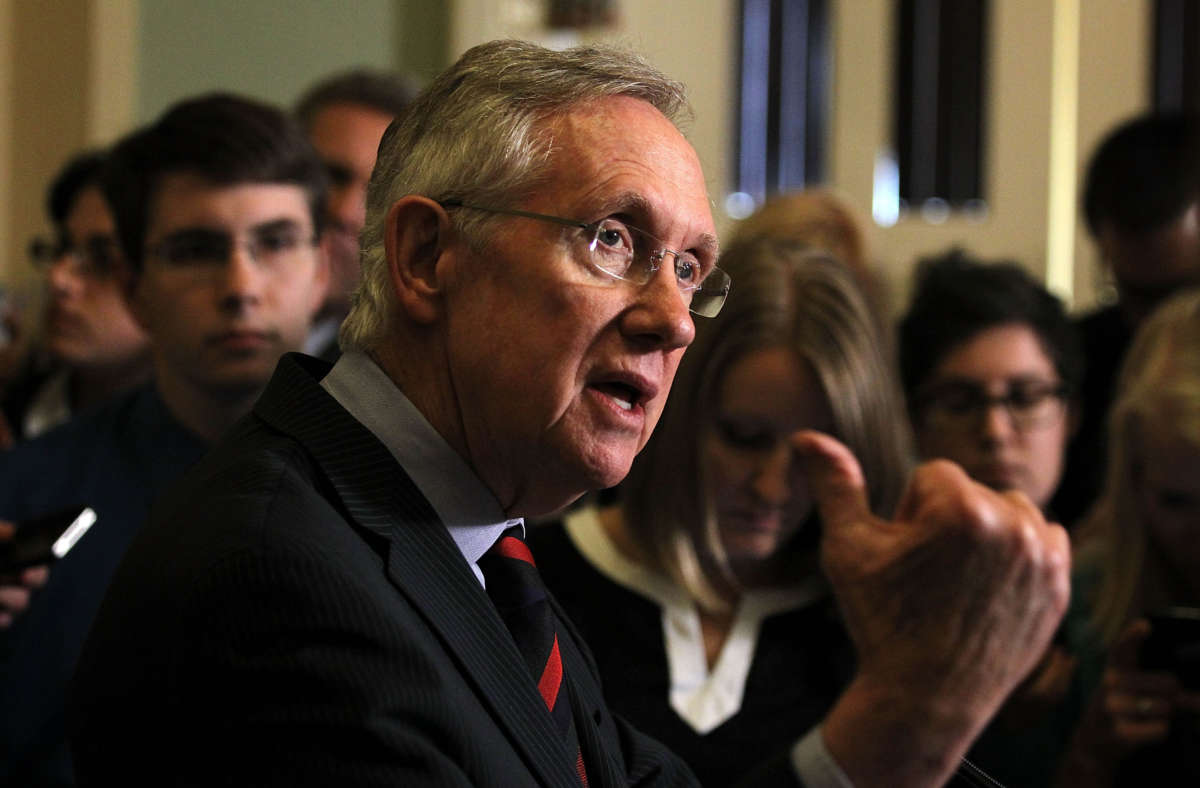Honest, paywall-free news is rare. Please support our boldly independent journalism with a donation of any size.
Harry Reid, who served five terms as a Democratic senator from Nevada, including four stints as Senate Majority Leader, died on Tuesday at the age of 82, after four years of treatment for pancreatic cancer.
Reid’s legacy includes major pieces of legislation, including the Affordable Care Act (sometimes known as Obamacare), and reforms in the Senate, such as small but significant changes to the filibuster for judicial and executive branch nominees.
In marking his passing, many observers took note of Reid’s recent stance against the filibuster, with the former Minority House Leader advocating for its abolition.
However, in 2013, he compromised with Senate Minority Leader Mitch McConnell in a deal that created both temporary and permanent changes to the rule while keeping it in place, allowing GOP lawmakers to continue blocking many pieces of popular legislation during the Obama administration.
But Reid has come around on the issue of the filibuster, arguing for its end.
“The Senate is now a place where the most pressing issues facing our country are disregarded, along with the will of the American people overwhelmingly calling for action,” Reid wrote in an opinion piece for The New York Times in August 2019. “The future of our country is sacrificed at the altar of the filibuster.”
“If the Senate cannot address the most important issues of our time, then it is time for the chamber itself to change, as it has done in the past,” Reid added.
In September 2021, Reid wrote another op-ed, this time appealing to Nevadans in the Las Vegas Sun. Reid described the Senate as “a legislative graveyard where the minority rules and bills that we as a country desperately need go to die.”
Reid said that legislation with popular support — including the PRO Act, the Equality Act, voting rights and abortion protections recognized in Roe v. Wade — were all blocked due to the filibuster.
“The sanctity of the Senate is not the filibuster,” Reid said. “The sanctity of the Senate — in government as a whole — is the power it holds to better the lives of and protect the rights of the American people. We need to get the Senate working again.”
In noting Reid’s passing, many commentators on social media said that eliminating the filibuster, once and for all, would be the best way to honor him.
“Something that I appreciated about Harry Reid was that he was willing to see the government less as a tool to preserve the status quo and more as one to meet present and future needs,” said Chris Ford, a media relations associate for the NAACP Legal Defense Fund, sharing Reid’s New York Times op-ed in his post. “It is perfectly acceptable to alter the government when it doesn’t work.”
“In a chamber where too many Democrats can be afraid of their own shadow, Harry Reid was willing to deliver for the American people and didn’t care what it took. They should learn from his example and abolish the filibuster,” opined Rep. Mondaire Jones (D-New York).
Although moderate Democrats, like Senators Joe Manchin (D-West Virginia) and Kyrsten Sinema (D-Arizona), stand in the way of reforming or eliminating the filibuster, many polls have demonstrated that voters support reforming or completely getting rid of the rule, especially if it would help lawmakers pass important pieces of legislation. Even President Joe Biden believes that the filibuster should, at a minimum, be changed to require senators to actually stand and speak for it to be implemented.
A terrifying moment. We appeal for your support.
In the last weeks, we have witnessed an authoritarian assault on communities in Minnesota and across the nation.
The need for truthful, grassroots reporting is urgent at this cataclysmic historical moment. Yet, Trump-aligned billionaires and other allies have taken over many legacy media outlets — the culmination of a decades-long campaign to place control of the narrative into the hands of the political right.
We refuse to let Trump’s blatant propaganda machine go unchecked. Untethered to corporate ownership or advertisers, Truthout remains fearless in our reporting and our determination to use journalism as a tool for justice.
But we need your help just to fund our basic expenses. Over 80 percent of Truthout’s funding comes from small individual donations from our community of readers, and over a third of our total budget is supported by recurring monthly donors.
Truthout’s fundraiser ended last night, and we fell just short of our goal. But your support still matters immensely. Whether you can make a small monthly donation or a larger one-time gift, Truthout only works with your help.
